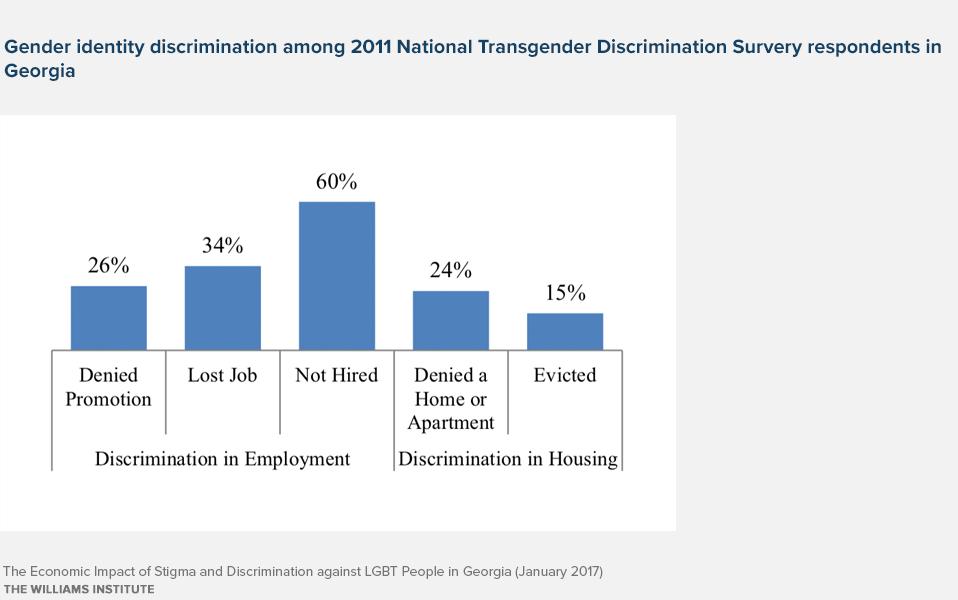Executive Summary
In Georgia, LGBT people face a challenging legal landscape and social climate, which contribute to stigma and discrimination against LGBT people in the workplace, at school, in housing, and in public life. Stigma and discrimination have been linked to negative economic impacts on governments, businesses, and the economy. For example, stigma and discrimination against LGBT employees affect businesses by creating a workforce that is less productive, and by making it more difficult for employers to recruit and retain the most talented employees. In addition, stigma and discrimination can lead to economic instability and health disparities for individuals, which increase social safety net costs for the state, and impact the economy by reducing productivity and increasing health care costs. For example, in terms of increased social safety net costs, we estimate that workplace and housing discrimination against transgender people costs the State of Georgia approximately $1,048,000 in state Medicaid expenditures and $477,000 in homeless shelter expenditures each year. In addition, we estimate that reducing the disparity between LGBT and non-LGBT people in rates of major depressive disorder would benefit the state’s economy by $110.6 million to $147.3 million each year, and reducing the disparity in rates of smoking would benefit the state’s economy by $81.5 million to $108.6 million each year. We conclude that if Georgia were to move toward a more supportive environment for LGBT people, the state government, business, and the economy would likely benefit.
Georgia is home to over 300,000 LGBT adults and 58,200 LGBT youth. LGBT people in the state face a challenging legal landscape and social climate. Statewide laws in Georgia offer no protections from discrimination on the bases of sexual orientation and gender identity in areas such as employment, housing, and public accommodations, and do not adequately protect LGBT youth from bullying in schools. The state also lacks a number of protections for LGBT people that have been enacted in other states, such as an LGBT-inclusive hate crimes law and laws that facilitate family formation for same-sex couples. Only a few localities in Georgia extend protections from discrimination to LGBT people through local ordinances, and generally, only to municipal government employees. In terms of social environment, Georgia ranks 38th in the nation on public support for LGBT rights and acceptance of LGBT people.
Georgia’s unsupportive legal landscape and social climate contribute to an environment in which LGBT people experience stigma and discrimination. Research has linked several forms stigma and discrimination against LGBT people to negative economic effects on businesses and governments. In this study, we consider three forms of LGBT stigma and discrimination that have economic implications: discrimination in employment and other settings; bullying and family rejection of youth; and health disparities experienced by LGBT people. In our analysis, we provide data and research documenting the prevalence of each type of stigma and discrimination in Georgia, and describe how each form is likely to affect the state’s economy. We also provide several illustrations of the magnitude of economic impact, in terms of annual cost to the state’s economy, where we have state-level data that allow us to make these estimates.

